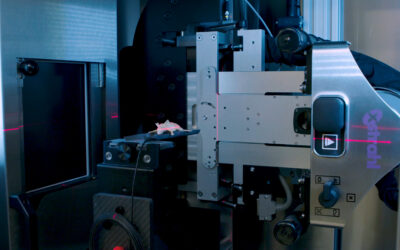Xstrahl in Action
A recent study aimed to characterize a detection system based on inorganic scintillators and determine its suitability for dosimetry in preclinical radiation research, using our Small Animal Radiation Research Platform (SARRP).
Publication
Characterization of Inorganic Scintillator Detectors for Dosimetry in Image-Guided Small Animal Radiotherapy Platforms
Authors
Ileana Silvestre Patallo, Anna Subiel, Rebecca Carter, Samuel Flynn, Giuseppe Schettino, and Andrew Nisbet
Key Findings
- The inorganic scintillators have the advantage over films and alanine in that they provide real-time measurement results and have smaller dimensions compared with ionization chambers.
- The methodology for cross-calibration contributes to the development of end-to-end tests to achieve independent dosimetry verification of RT plans delivered by image-guided small animal irradiation platforms.
- The development of in-vivo dose verification procedures for treatments with larger fields could expand the potential applications for the use of the inorganic scintillator system not only for IGSARTP, but also for conventional preclinical cabinet dosimetry.

Figure 4 – Angular response from DWS 1 scintillator detector. (left) longitudinal response, (right) polar response. Response is normalized against the signal measured at SARRP 0° gantry angle. SD correspond to the standard deviation of three readings at each gantry angle.
The Value of SARRP
To deliver image-guided targeted irradiations, SARRP used individual or combined beams defined by a set of brass collimators with small circular, square, or rectangular fields.







